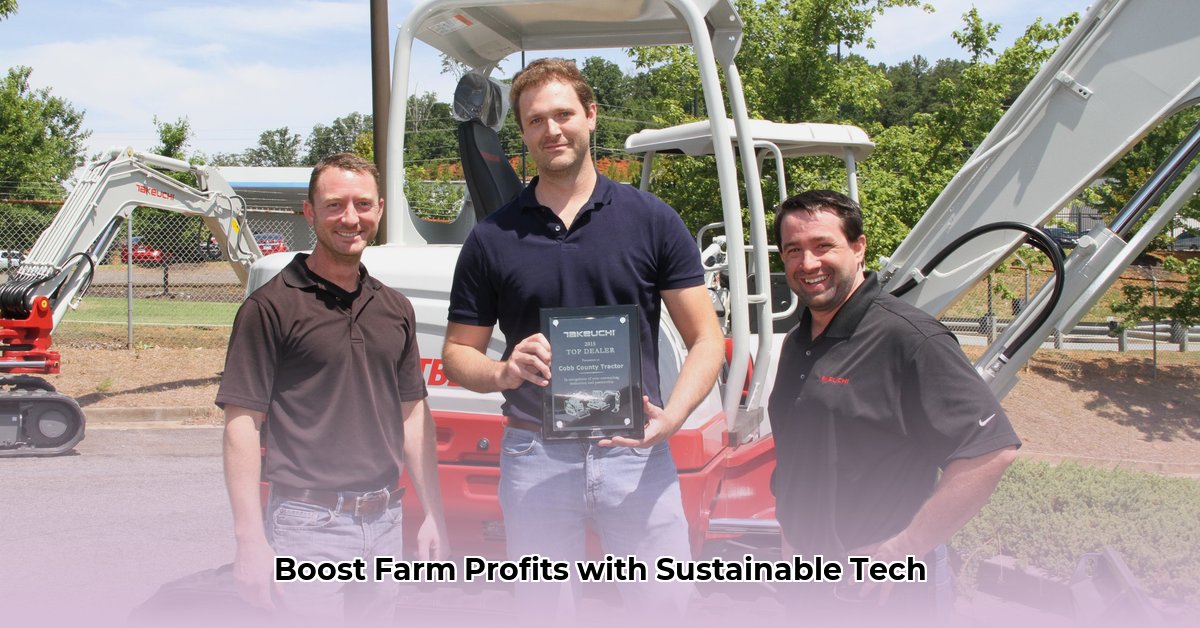
Sustainable farming isn't just a trend; it's the future of food security. Cobb County Tractor Co. is at the forefront, empowering farmers to increase profits while minimizing their environmental impact. This article explores how their innovative tractors and precision farming technologies drive efficiency and sustainability, providing actionable steps for farmers, government agencies, manufacturers, and financial institutions. For additional gardening resources, check out this helpful guide on raised bed gardening.
Fuel Efficiency: A Greener, More Profitable Bottom Line
Consider your tractor a vital business partner. Fuel-efficient models, readily available from Cobb County Tractor Co., significantly reduce operational costs. Lower fuel consumption translates to direct profit boosts—a substantial advantage in today's volatile market. But the benefits extend beyond the bottom line. Reduced fuel use means lower greenhouse gas emissions, contributing to a healthier environment. This is a win-win proposition, boosting both profitability and sustainability. Doesn't that make sound business sense?
Cobb County Tractor Co. offers a diverse range of fuel-efficient tractors, each designed for maximum efficiency. Their expert consultations help farmers select the ideal model for their specific needs and budget. Are you ready to upgrade to a more eco-friendly and profitable tractor?
Precision Farming: Maximizing Output, Minimizing Waste
Precision farming is like having a high-tech GPS system for your fields. Technologies like GPS-guided planting and variable-rate fertilization allow for optimized resource allocation—precisely applying fertilizer, water, and pesticides only where needed. This results in lower input costs, reduced environmental impact, and significantly higher yields. How much could you improve your yields with optimized resource management?
Cobb County Tractor Co. provides cutting-edge precision farming technology and expert guidance. Their team assists farmers in seamless integration of these tools into their operations, ensuring maximal efficiency and minimizing the learning curve.
Adapting to Climate Change: Building a Resilient Agricultural Future
Climate change presents unprecedented challenges to agriculture—unpredictable weather, increased pest pressure, and water scarcity. Cobb County Tractor Co. helps farmers navigate these issues by providing access to resilient technologies. Investing in water-conserving technologies or drought-resistant crop varieties is essential for securing the future of farming. What steps are you taking to ensure the resilience of your farm in the face of climate change?
Cobb County Tractor Co. acts as a valuable resource, guiding farmers towards solutions tailored to their specific circumstances and challenges. They offer a wealth of knowledge and resources to help farmers meet the changing demands of a fluctuating climate.
A Roadmap to Sustainable Success: Actionable Steps for All Stakeholders
The following table outlines short-term and long-term strategies for various stakeholders involved in promoting sustainable and efficient agriculture. Collaboration is key to achieving a truly transformative impact on the agricultural landscape.
| Stakeholder | Short-Term Goals (0-1 Year) | Long-Term Goals (3-5 Years) |
|---|---|---|
| Small-Scale Farmers | Explore government grants, consider equipment leasing or rental options from Cobb County Tractor Co. | Invest in entry-level precision farming tech (GPS, yield monitors) through financing programs. |
| Large-Scale Farmers | Upgrade farm management software; explore hybrid or electric tractor options. | Develop in-house data management; explore AI-powered decision-making tools. |
| Government | Offer training programs on sustainable farming practices; fund sustainable farming research. | Expand rural broadband access; increase funding for sustainable farming research and technology development. |
| Manufacturers | Develop more sustainable and affordable tractors and equipment. | Integrate AI and IoT into machinery design; focus on circular economy principles in product life cycles. |
| Financial Institutions | Offer specialized financing for sustainable farming technologies. | Develop credit scoring models that value sustainable farming practices; explore impact investing. |
Cobb County Tractor Co. is actively involved in numerous initiatives, collaborating extensively to extend the benefits of sustainable technology to farmers of all scales and geographies. They recognize that a thriving agricultural landscape requires a collaborative commitment to positive change. Are you ready to join this movement?
“The transition to sustainable agriculture requires a collaborative effort,” says Dr. Emily Carter, Agricultural Economist at the University of Georgia. “Cobb County Tractor Co. is instrumental in facilitating this transition by providing both the technology and the knowledge to farmers.”
How to Finance Sustainable Farming Technology Adoption
Sustainable farming demands significant upfront investment. However, several innovative financing models are bridging this gap, creating pathways for farmers to adopt sustainable practices without insurmountable financial obstacles. Let's delve into these effective solutions.
Innovative Financing Models: Bridging the Investment Gap
Numerous models are helping farmers acquire sustainable technologies. These are not theoretical concepts; they are transforming the agricultural landscape.
Blended Finance: This model combines public and private funding, reducing the initial financial burden for farmers. Government grants or subsidies lower upfront costs, while private investors see the potential return on investment in sustainable agriculture.
Supply Chain Finance: Large food companies or processors provide financial incentives to their suppliers (farmers) who adopt sustainable practices. This creates a market for sustainably produced goods, incentivizing adoption.
Risk-Sharing Mechanisms: Insurance programs or performance-based contracts help farmers mitigate the risks associated with adopting new technologies. This reduces financial uncertainty for farmers.
A Roadmap for Successful Financing: Actionable Steps
Successful financing requires a strategic approach from every stakeholder.
Farmers: Research funding options; build strong relationships with agribusinesses and financial institutions; utilize data-driven farm management.
Agribusinesses/Corporations: Invest in sustainable initiatives; develop incentive programs for farmers; collaborate with lenders to create customized financial products.
Governments and NGOs: Increase funding for research and development; promote supportive policies and financial incentives; provide comprehensive education and resources to farmers.
Financial Institutions: Develop tailored loan products; incorporate ESG (Environmental, Social, and Governance) factors into lending processes; invest in accurate risk-assessment tools.
Overcoming the Challenges
While opportunities abound, challenges remain. Challenges include data collection for risk assessment and the need for standardized metrics for transparent reporting. Continued innovation is crucial to scaling these financing solutions globally and ensuring that all farmers have access to these mechanisms.